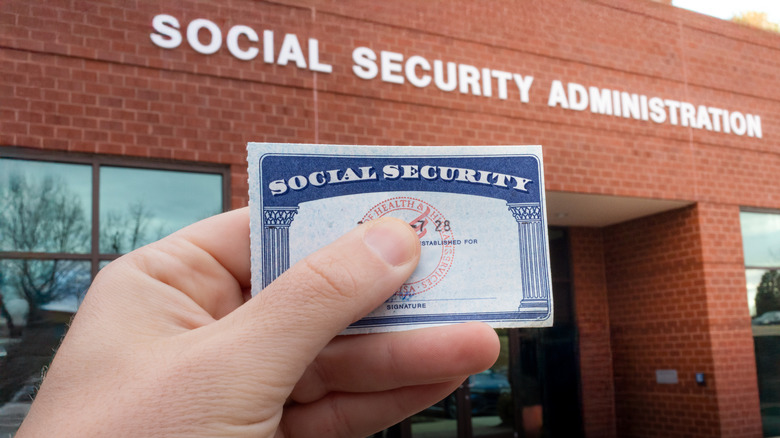The 4 Worst Ages To Retire Hands Down
In preparation for retirement, most workers will want to understand what their monthly Social Security benefits might be. Monthly benefit checks in January 2024 averaged a little north of $1,900. On the whole, this keeps the average check amount in line with the reality that Social Security tends to replace about 40% of your pre-retirement income. However, there are many factors that can alter the value of the check you will eventually receive. In particular, retiring early frequently translates into a reduction of benefits. In fact, you'll find your check value reduced at an increasing rate for every year you claim benefits before turning 67 — the full retirement age for those born in 1960 or later.
An early Social Security draw can begin at age 62, but you'll receive a check value for just 70% of the full retirement benefit you would earn by waiting until age 67. Keep in mind, unless you utilize the built-in reset rule within the first year of beginning your claim, your check value will be reduced by this percentage in perpetuity. What this means is that many Social Security recipients will hit a breakeven point where finances will start to fall behind the pace at which you would have earned benefits had you decided to wait to receive them. Statistically speaking, taking Social Security benefits early is worse for you over the long term. However, four ages in particular calculate as the least beneficial times to start taking benefits.
64 is the worst age, statistically, to start claiming benefits
A 2019 United Income study looking at actual claim versus optimal claim data for 20,000 retired workers pointed to 64 as the least optimal age to begin drawing Social Security benefits. While it's entirely clear why, a few important details might illuminate the trouble that 64 year old claimants face. Based on tables from the SSA, it's obvious that the earlier you start taking Social Security checks, the greater the reduction in value becomes. However, the change from year to year isn't linear.
Let's explore a hypothetical benefit valued at $1,000 to gain a better understanding: At 67 you would receive a 100% payout, or the full $1,000. By claiming one year early you'll see a 6.7% reduction, resulting in a $930 check. The jump from 66 to 65 sees a 6.6% penalty reduction (with a check value of $867). Down one more year and that reduction is 6.7% (or $800 at age 64). From here, the reduction is 5% for each of the next two steps down ($750 at 63 and $700 at 62). The larger penalty in the years directly ahead of full retirement age creates a disproportionate effect on potential benefits. By claiming at 63, for instance, you won't see as large a reduction between this and the next year versus 64 compared to 65. However, you will lose a full year of checks by waiting. 64 seems to be stricken most significantly by this unique changeover in penalty rates.
63 and 65 also garner negative attention
Even though 64 appears to be the least optimal time to begin claiming Social Security benefits, Every other year you might consider drawing early is also less optimal than waiting for your full retirement age — or even extending your start date out beyond it. Naturally, waiting until you turn 70 to begin claiming benefits provides the most optimal path. However, it's not always possible for someone to wait until 70 to take advantage of the 124% payout rate.
Claiming benefits at 63 and 65 also results in benefits reductions. At 63 you'll receive a 75% check value, while your benefit at 65 would be delivered at an 86.7% payout figure. Both of these ages provide some early value, but there's a case to be made for claiming as early as possible if you're going to end up starting before full retirement age anyways. Waiting until 65, for instance, doesn't offer a major change of pace from waiting until you hit full retirement age, but it will sacrifice a notable portion off the top of your benefit checks. Retiring at age 63 and starting your benefits gives you a number of crucial years to play with but again. However, the 5% difference between 62 and 63 might suggest that waiting this additional year is a waste of your time — unless you absolutely have to keep working for that final 12 month period in order to hit other retirement goals.
62 is statistically problematic, but there's more to consider
Retiring at 62 is another year that's flagged as one of the least optimal ages to begin claiming Social Security benefits. By retiring at 62, you'll sacrifice a substantial 30% slice off the top of your retirement benefits throughout the rest of your life. However, many people seek an early retirement so that they can spend more time with loved ones or take more time to engage in their hobbies. The five years between 62 and full retirement age can be an immensely full and enriching time, whereas the five years after you turn 67 can be more likely to add health complications and other setbacks into the mix. Anyone who can retire early frequently seeks to, and 62 is a common target for those looking for an early exit. In fact, the average retirement age in the United States was 62 in 2024, unsurprisingly lining up perfectly with the age at which benefits can be initiated.
Dave Ramsey in particular suggests starting to claim your benefits at 62 and then investing in order to get ahead of schedule. While this can be a fairly valuable approach, it's important to remember that your benefit checks will be temporarily reduced based on your earnings before reaching full retirement age. It's entirely possible to start claiming benefits but receive monthly deposits valued at zero. If you plan to continue working normally when you start taking benefits, this temporary reduction can significantly hamper that plan.
The best approach for you is a unique calculation
As is frequently the case with retirement planning, the best way to go about saving for this transition — and deciding when to take your Social Security benefits –is unique to you. Some people will see the greatest benefit come from an early draw that starts as soon as they turn 62. Others might need to wait another few years to hit their individual savings goals before dropping out of the workforce. This might be at 64, even though that age is statistically least optimal. In an ideal world, you will have saved enough money on your own so that Social Security checks serve to add a nice buffer but aren't necessarily essential. Under these circumstances, you might retire at any age that suits you, even waiting until 70 to start adding in Social Security checks if it makes financial sense. However, that's not a realistic expectation for many workers.
Another important element to consider is the fact that the earlier you begin your retirement, the less money you'll have to contribute into your retirement savings. It's best to begin saving for your eventual workforce exit sometime in your early 20s in order to set yourself up for a financial position filled with options. A reduced Social Security benefit might not matter all that much when it comes to enjoying more of your golden years, so make the choice that works for you.




